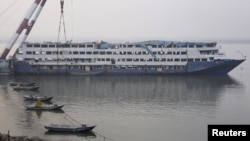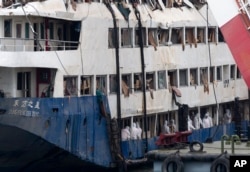After a six-month investigation, China has concluded that strong storms caused the sinking of the cruise ship Eastern Star in the Yangtze River in early June that killed 442 people.
Authorities, however, also held 45 people from the shipping company and local authorities responsible, imposing penalties ranging from job transferal to demotion, for flaws in their daily management and supervision.
The Cabinet’s investigation team found that a downburst with a maximum gust of up to 38 meters per second, which was double of the ship’s capability to resist, capsized Eastern Star before it sank the evening of June 1.
Authorities concluded the disaster was caused by “a rare and sudden type of convective weather, although the captain had taken measures to stabilize the ship,” members of the investigation team told a media briefing late Wednesday.
There was speculation that the ship's previous renovations that increased its overall height had affected its ability to right itself in the face of storms, however authorities concluded the modifications had only a limited impact on stability.
Not a criminal case?
Among those held responsible, the ship’s captain Zhang Shuwen and his chief officer, who was later found drowned to death, were onboard.
In spite of their seniority, the crew’s lack of knowledge about extreme weather apparently left them clueless about what to do. Because of that, they neither called for outside help nor alerted passengers who mostly stayed inside their cabins, the investigation found. And that was why it took nearby maritime authorities in Yueyang City of Hunan province almost two hours to confirm the incident, the report added.
Authorities have decided to revoke Zhang’s license. He will face further judicial investigation.
But a lawyer said Zhang may walk away free of any criminal charges now that the blame is on the weather.
“If [the disaster] is caused by strong wind and waves, and nothing to do with his maneuvering of the ship, insurance companies should then take up the [compensation] responsibility,” said Liang Shuquan, a maritime lawyer from Guangxi province, adding the shipping company will inevitably be taken to the civil courts.
Skepticism online
Placing the blame on the weather has raised some suspicions among skeptics who fault in the crew's failure to call for help or help passengers evacuate.
There were some Internet users who voiced their skepticism.
A Weibo user wrote “In order to skirt responsibilities, [investigators] have run out of words [excuses].”
Another user asked, “Why did the ship still have to move on under heavy rains? Who can give us an answer?”
Investigators have also ordered to shut down the shipping company for an overhaul.
Tightened safety measures
To prevent similar tragedies, the investigation team further proposed that transportation regulators should consider barring cruise ships from departing harbors if wind gust are forecast to reach a maximum speed of 52 kilometers per hour or the visibility is under 1,000 meters.
But a marine science professor argues that increased instances of extreme weather should prompt authorities to revisit those safety regulations.
“If [the extreme weather] is too hard to predict or arrive too suddenly, the risk of danger increases,” said Zhu Yuzhu, a professor from Dalain Maritime University, who had previously questioned the safety of Eastern Star’s renovated structure.
The professor stressed the urgency of developing a pre-warning system, which specializes in forecasting extreme weather to help ships navigate.





